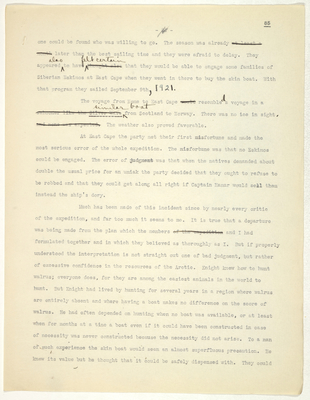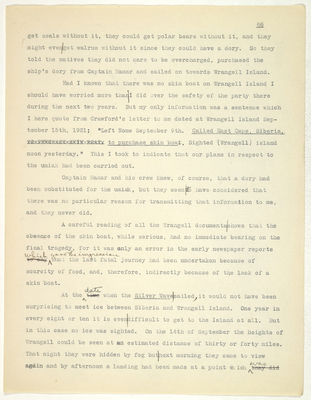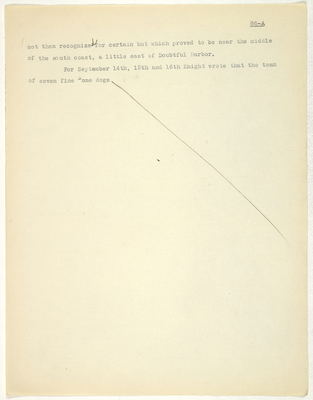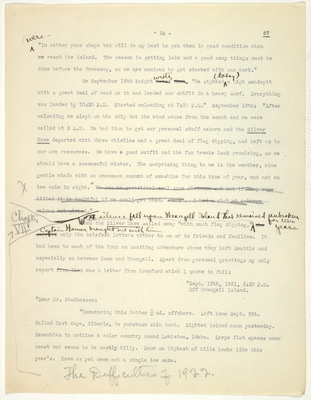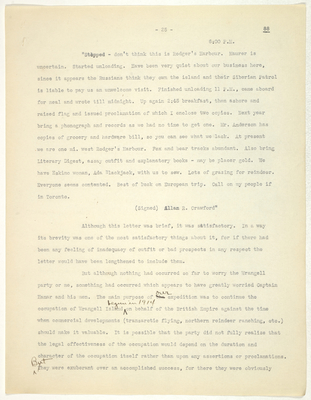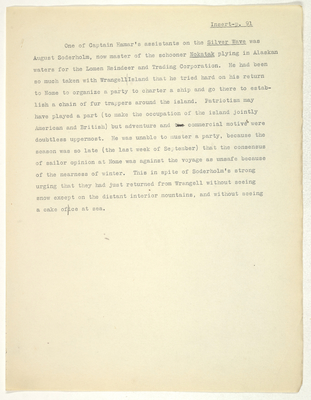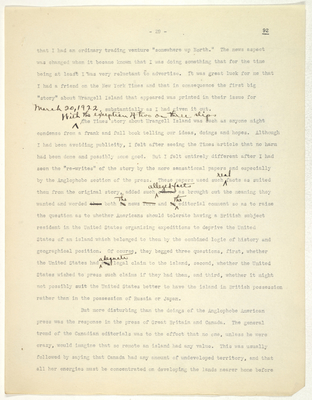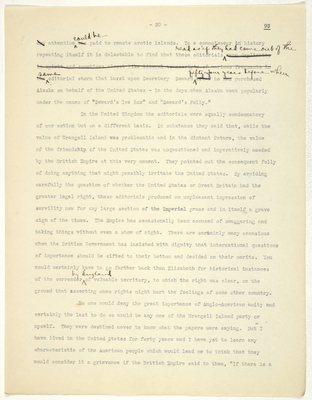Pages That Need Review
stefansson-wrangel-09-27
stefansson-wrangel-09-27-045
85
- 22 -
one could be found who was willing to go. The season was already at least a month later than the best sailing time and they were afraid to delay. They appeared also to have felt certain thought also that they would be able to engage some families of Siberian Eskimos at East Cape when they went in there to buy the skin boat. With that program they sailed September 9th, 1921.
The voyage from Nome to East Cape would resembled a voyage in a schooner like the Silver Wave similar boat from Scotland to Norway. There was no ice in sight, and none was expected. The weather also proved favorable.
At East Cape the party met their first misfortune and made the most serious error of the whole expedition. The misfortune was that no Eskimos could be engaged. The error of judgment was that when the natives demanded about double the usual price for an umiak the party decided that they ought to refuse to be robbed and that they could get along all right if Captain Hamar would sell them instead the ship's dory.
Much has been made of this incident since by nearly every critic of the expedition, and far too much it seems to me. It is true that a departure was being made from the plan which the members of the expedition and I had formulated together and in which they believed as thoroughly as I. But if properly understood the interpretation is not straight out one of bad judgment, but rather of excessive confidence in the resources of the Arctic. Knight knew how to hunt walrus; everyone does, for they are among the easiest animals in the world to hunt. But Knight had lived by hunting for several years in a region where walrus are entirely absent and where having a boat makes no difference on the score of walrus. He had often depended on hunting when no boat was available, or at least when for months at a time a boat even if it could have been constructed in case of necessity was never constructed because the necessity did not arise. To a man of such experience the skin boat would seem an almost superfluous precaution. He knew its value but he thought that it could be safely dispensed with. They could
stefansson-wrangel-09-27-046
86
get seals without it, they could get polar bears without it, and they might ever get walrus without it since they could have a dory. So they told the natives they did not care to be overcharged, purchased the ship’s dory from Captain Hamar and sailed on towards Wrangell Island.
Had I known that there was no skin hoat on Wrangell Island I should have worried more than I did over the safety of the party there during the next two years. But my only information was a sentence which I here quote from Crawford’s letter to me dated at Wrangell Island September 15th, 1921; "Left Nome September 9th. Called East Cape, Siberia, [XgxkMRilxk.kxxSxlkxkihlkx] to purchase skin boat. Sighted (Wrangell) island noon yesterday." This I took to indicate that our plans in respect to the umiak had been carried out.
Captain Hamar and his crew knew, of course, that a dory had been substituted for the umiak, but they seem to have considered that there was no particular reason for transmitting that information to me, and they never did.
A careful reading of all the Wrangell documents shows that the absence of the skin boat, while serious, had no immediate bearing on the final tragedy, for it was anly an error in the early newspaper reports to say which gave the impression that the last fatal journey had been undertaken because of scarcity of food, and, therefore, indirectly because of the lack of a skin boat.
At the date time when the Silver Wave sailed, it would not have been surprising to meet ice between Siberia and Wrangell Island. One year in every eight or ten it is even difficult to get to the Island at all. But in this case no ice was sighted. On the 14th of September the heights of Wrangell could be seen at an estimated distance of thirty or forty miles. That night they were hidden by fog but next morning they came to view again and by afternoon a landing had been made at a point which was they did
stefansson-wrangel-09-27-047
86-A
not then recognized for certain but which proved to be near the middle of the south coast, a little east of Doubtful Harbor.
For September 14th, 15th and 16th Knight wrote that the team of seven fine Nome dogs
stefansson-wrangel-09-27-048
87
- 24 -
were "in rather poor shape but will do my best to get them in good condition when we reach the island. The season is getting late and a good many things must be done before the freezeup, so we are anxious to get started with our work.”
On September 15th Knight wrote notes that "We sighted (today) a high sandspit with a great deal of wood on it and landed our outfit in a heavy surf. Everything was landed by 10:30 P.M. Started unloading at 7:00 P.M." September 16th: "After unloading we slept on the ship but the wind arose from the south and we were called at 3 A.M. We had time to get our personal stuff ashore and the Silver Wave departed with three whistles and a great deal of flag dipping, and left us to our own resources. We have a good outfit and the fox tracks look promising, so we should have a successful winter. The surprising thing to me is the weather, nice gentle winds with an uncommon amount of sunshine for this time of year, and not an ice cake in sight. "We see an occasional seal some distance out but if they were killed it is doubtful if we could get them ... I had a shot a a large walrus but missed."
Chapter VII
When the Silver Wave sailed away "with much flag dipping," a silence fell upon Wrangell Island that remained unbroken for two years. she carried Captain Hamar brought out with him only the briefest letters either to me or to friends and families. It had been to each of the four an exciting adventure since they left Seattle and especially so between Nome and Wrangell. Apart from personal greetings my only report from them was a letter from Crawford which I quote in full:
"Sept. 15th, 1921, 5:30 P.M. Off Wrangell Island.
"Dear Mr. Stefansson:
"Commencing this letter 1/2 mi. offshore. Left Nome Sept. 9th. Called East Cape, Siberia, to purchase skin boat. Sighted island noon yesterday. Resembles in outline & color country round Lewiston, Idaho. Large flat spaces near coast but seems to be mostly hilly. Snow on highest of hills looks like this year's. Have as yet seen not a single ice cake.
The Difficulties of 1922.
stefansson-wrangel-09-27-049
- 25 -
88
6:00 P.M.
’'Stepped - don’t think this is Rodger’s Harbour. Maurer is uncertain. Started unloading. Have been very quiet about our business here, since it appears the Russians think they own the island and their Siberian Patrol is liable to pay us an unwelcome visit. Finished unloading 11 P.M., came aboard for meal and wrote till midnight. Up again 2:45 breakfast, then ashore and raised flag and issued proclamation of which I enclose two copies. Next year bring a phonograph and records as we had no time to get one. Mr. Anderson has copies of grocery and hardware bill, so you can see what we lack. At present we are one mi. west Rodger’s Harbour. Fox and bear tracks abundant. Also bring Literary Digest, assay outfit and explanatory books - may be placer gold. We have Eskimo vroman, Ada Blackjack, with us to sew. Lots of grazing for reindeer. Everyone seems contented. Best of luck on European trip. Call on my people if in Toronto.
(Signed) Allan R. Crawford”
Although this letter was brief, it was satisfactory. In a way its brevity was one of the most satisfactory things about it, for if there had been any feeling of inadequacy of outfit or bad prospects in any respect the letter would have been lengthened to include them.
But although nothing had occurred so far to worry the Wrangell party or me, something had occurred which appears to have greatly worried Captain Hamar and his men. The main purpose of our expedition was to continue the occupation of Wrangell Island beginning in 1914 on behalf of the British Empire against the time when commercial developments (transarctic flying, northern reindeer ranching, etc.) should make it valuable. It is possible that the party did not fully realize that the legal effectiveness of the occupation would depend on the duration and character of the occupation itself rather than upon any assertions or proclamations. But they were exuberant over an accomplished success, for there they were obviously
stefansson-wrangel-09-27-052
- 26 - 91
little more than casual notice of these discussions. However, it appears that the talk the eventually crystallized into some sort of protest which was eventually sent by Alaskans to Washington.
Insert here page following
From After the landing of the party in Wrangell Island and the safe return of the Silver Wave to Nome I saw had seen no cause for doing anything special for some months, There was an election on in Canada and there was no point in trying to urge the Government to action until we knew who would be the Government next summer when the supply ship for Wrangell Island would have to sail. I felt sure of the safety and comfort of the party. My stock reply to constant inquiries was that they were as safe and comfortable as a party equally isolated on a tropical an island like such as Robinson' Crusoe's. They were doing the sort of thing that I had dreamed about doing from childhood, which they had always wanted to do, and which at least one healthy young man in every five in Europe or America would dearly love to have the chance to do.
And if I was not worrying about the situation up there, neither was I worrying about any more southerly aspect of it, when one day a newspaper friend told me that a "big story" about Wrangell Island was about to “break," and gave me the chance of publishing my version before another, probably more inaccurate, should would come from Washington. The New York Times had found out about the protest from Alaska to Washinton to the delegate in Congress and had realised the news value of it but was anxious to have not merely some story but the accurate facts.
Up to this time I had been much pleased with the absence of interest in the Wrangell Island undertaking. Those journalists who knew about it probably imagined that I was anxious for publicity on the subject and were keeping things quiet for that reason, it being the instinct of newspaper men to drag a story, out of you if you are reluctant but to be very suspicious of any information you voluntarily give them. I had not given them information voluntarily, but neither had I allowed anybody to discover that I had anything to hide. It was supposed
stefansson-wrangel-09-27-053
Insert-p. 91
One of Captain Hamar’s assistants on the Silver Wave was August Soderholm, now master of the schooner Nokatak plying in Alaskan waters for the Lomen Reindeer and Trading Corporation. He had been so much taken with Wrangell Island that he tried hard on his return to Nome to organize a party to charter a ship and go there to establish a chain of fur trappers around the island. Patriotism may have played a part (to make the occupation of the island jointly American and British) but adventure and commercial motives were doubtless uppermost. He was unable to muster a party, because the season was so late (the last week of September) that the consensus of sailor opinion at Nome was against the voyage as unsafe because of the nearness of winter. This in spite of Soderholm's strong urging that they had just returned from Wrangell without seeing snow except on the distant interior mountains, and without seeing a cake of ice at sea.
stefansson-wrangel-09-27-054
- 29 - 92
that I had an ordinary trading venture "somewhere up North." The news aspect was changed when it became known that I was doing something that for the time being at least I was very reluctant to advertise. It was great luck for me that I had a friend on the New York Times and that in consequence the first big "story" about Wrangell Island that appeared was printed in their Issue for March 20,1922, substantially as I had given it out.
With the expedition of two or three ships the Times story about Wrangell Island was such as anyone might condense from a frank and full book telling our ideas, doings and hopes. Although I had been avoiding publicity, I felt after seeing the Times article that no harm had been done and possibly some good. But I felt entirely different after I had seen the "re-writes" of the story by the more sensational papers and especially by the Anglophobe section of the press. These papers used such real facts as suited them from the original story, added such others alleged facts as brought cut the meaning they wanted and worded them both in the news form and in the editorial comment so as to raise the question as to whether Americans should tolerate having a British subject resident in the United States organizing expeditions to deprive the United States of an island which belonged to them by the combined logic of history and geographical position. Of course, they begged three questions, first, whether the United States had any adequate legal claim to the island, second, whether the United States wished to press such claims if they had them, and third, whether it might not possibly suit the United States better to have the island in British possession rather than in the possession of Russia or Japan.
But more disturbing than the doings of the Anglophobe American press was the response in the press of Great Britain and Canada. The general trend of the Canadian editorials was to the effect that no one, unless he were crazy, would imagine that so remote an island had any value. This was usually followed by saying that Canada had any amount of undeveloped territory, and that all her energies must be concentrated on developing the lands nearer home before
stefansson-wrangel-09-27-055
- 30 - 93
any attention was could be paid to remote arctic islands. To a connoisseur in history repeating itself it is delectable to find that these editorials read as if they had come out of the were duplicates in spirit and sometimes almost like literal [busnseripte] of various fragments in the editorial storm that burst upon Secretary Seward aford fifty-four years before where he had purchased Alaska on behalf of the United States - in the days when Alaska went popularly under the names of "Seward's Ice Box" and "Seward's Folly."
In the United Kingdom the editorials were equally condemnatory of our action but on a different basis. In substance they said that, while the value of Wrangell Island was problematic and in the distant future, the value of the friendship of the United States was unquestioned and imperatively needed by the British Empire at this very moment. They pointed out the consequent folly of doing anything that might possibly irritate the United States. By avoiding carefully the question of whether the United States or Great Britain had the greater legal right, these editorials produced an unpleasant impression of servility new for any large section of the Imperial press and in itself a grave sign of the times. The Empire has occasionally been accused of swaggering and taking things without even a show of right. There are certainly many occasions when the Britisn Government has insisted with dignity that international questions of importance should be sifted to their bottom and decided on their merits. You would certainly have to go farther back than Elizabeth for historical instances of the surrender by England of valuable territory, to which the right was clear, on the ground that asserting ones rights might hurt the feelings of some other country.
No one would deny the great importance of Anglo-American amity and certainly the last to do so would be any one of the Wrangell Island party or myself. They were destined never to know what the papers were saying. But I have lived in the United States for forty years and I have yet to learn any characteristic of the American people which would lead me to think that they would consider it a grievance if the British Empire said to them, "If there is a
stefansson-wrangel-09-27-056
94 - 31 -
question between us as to the ownership of territory, let us discuss it quietly and if necessary submit it to impartial outside arbitration.
Insert pages 94A,B and C
The commotion was not confined to the English-speaking press. Editorials began to be published in Russia and news despatches to circulate to the effect that Russia had "always” claimed Wrangell Island, that the claim had always been undisputed, and that the Russians were the original discoverers. Most extraordinary of all was the Russian assertion that the discoverer had been Lieutenant Ferdinand Wrangell who had landed on the island "between the years 1821 and 1824." It is interesting to speculate whether these Soviet documents were based on actual Russian ignorance of the author or merely upon their cynical assumption of complete British and American ignorance not only of the history of British and American exploration but also of the history of Russian exploration and development. I incline to the letter view. Some of the statesmen of the Russian Revolution were qualified to come to a California mining town and teach the star gawkers there the meaning of the word "bluff".
Besides the Wrangell Island venture which looked towards the development of transpolar air commerce, I had on hand in 1921 two major projects with regard to the North. I was anxious to get private individuals to realize as soon as possible the great potentialities of the Canadian Arctic as a pasture land for reindeer. In this I had been already measurably successful, for I had induced the Hudson's Bay Company to transport several hundred reindeer from Norway for an experimental ranch in Baffin Island. Like many another pioneer enterprise. this one had has suffered through accidents not directly connected with the climate but due to the human factor. The herds had [kxjg] bad luck the first year, good the second, and we are now (summer 1924) waiting with bated breath for the news of the third winter. If it is good, a war has been won; if it is bad, a skirmish has gone against us but other battles and the war itself will be won later hereafter. Through the nature of the animals and the country the reindeer enterprise must sometime succeed in Arctic Canada.
My second undertaking was to create interest that should eventually
